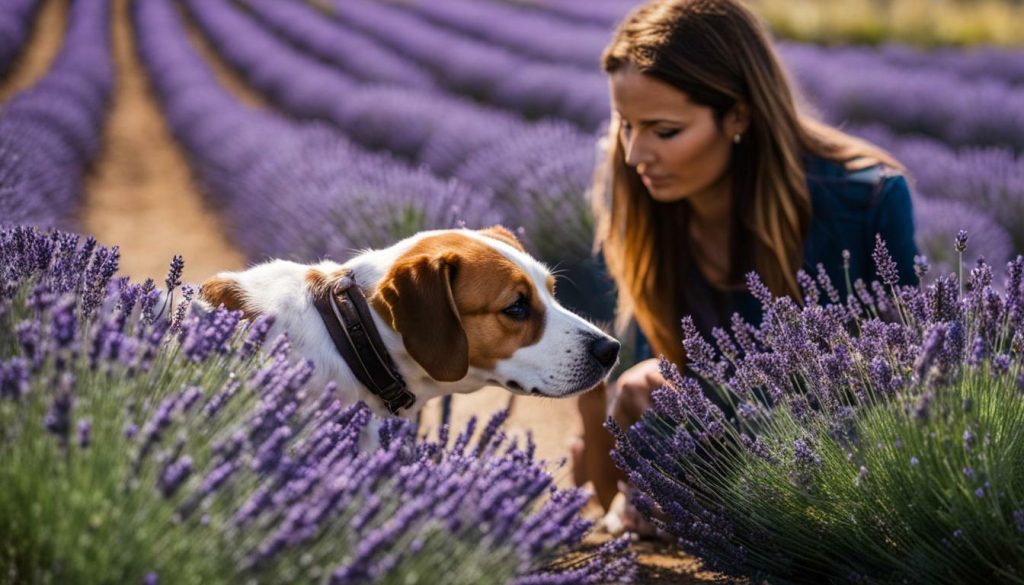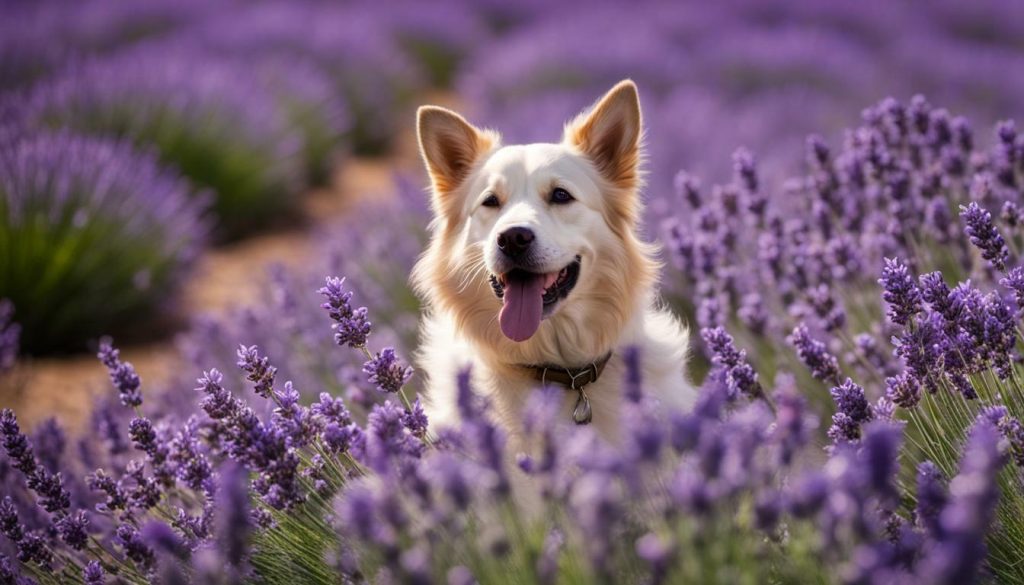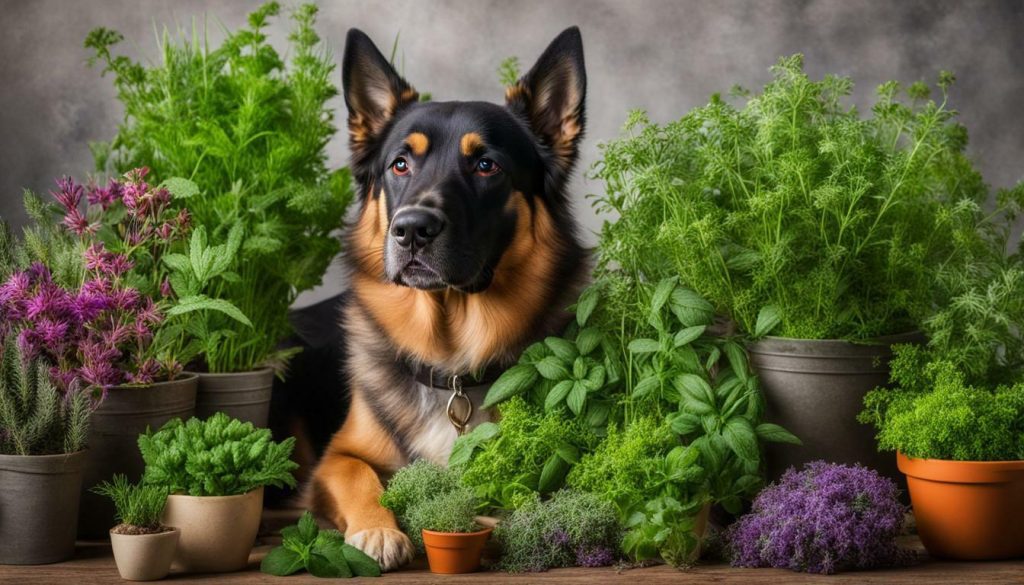
Many pet owners wonder if it is safe for dogs to eat lavender, so let’s explore the facts to ensure the well-being of our four-legged friends.
- Lavender is generally non-toxic to dogs, but large quantities can be dangerous and cause intestinal blockages.
- Symptoms of lavender poisoning in dogs include abdominal pain, distended abdomen, loss of appetite, vomiting, and fever.
- Using lavender essential oil on dogs should be done cautiously and requires proper dilution. It can cause skin irritation if not diluted correctly.
- Aromatherapy with lavender oil can help dogs relax, but it should not be ingested. Diffusing lavender oil around dogs can cause respiratory issues.
- Consulting with a veterinarian before using lavender for dogs is highly recommended to ensure the safety and well-being of your pet.
- It’s important to keep lavender plants and essential oils out of reach of dogs to prevent ingestion and potential harm.
By understanding the potential risks and benefits of lavender for dogs, we can create a safe and healthy environment for our furry companions. Consult a professional to make informed decisions about your dog’s well-being.
Lavender Toxicity in Dogs: Potential Risks and Symptoms
While lavender is generally non-toxic to dogs, consuming large quantities can pose potential risks and lead to lavender poisoning, which manifests through various symptoms. Dog owners must know these risks and recognize the signs of lavender poisoning in their pets.
Symptoms of lavender poisoning in dogs include abdominal pain, a distended abdomen, loss of appetite, vomiting, and fever. If you suspect your dog has ingested a lot of lavender or is displaying any of these symptoms, it is crucial to seek veterinary attention immediately.
To avoid any potential harm, it is recommended to keep lavender plants and essential oils out of reach of dogs. Prevention is key to ensuring their safety and well-being. It’s also essential to consult with a veterinarian before using lavender or other natural remedies for dogs, as each dog may have individual sensitivities or health conditions that must be considered.
While lavender can benefit dogs, using it in moderation and under professional guidance is important. Being proactive and informed can create a safe and healthy environment for furry friends.
| Signs of Lavender Poisoning in Dogs | Precautions to Take |
|---|---|
| Abdominal pain | Keep lavender plants and essential oils out of reach of dogs |
| Distended abdomen | Consult with a veterinarian before using lavender or any other natural remedies |
| Loss of appetite | Seek veterinary attention immediately if poisoning is suspected |
| Vomiting | |
| Fever |
Lavender Essential Oil and Dogs: Dilution and Skin Irritation
Lavender essential oil can benefit dogs, but it is important to dilute it appropriately to avoid potential skin irritation. When using lavender oil topically on dogs, it is crucial to remember that their skin is more sensitive than ours. Undiluted essential oils can be too strong and may cause adverse reactions.

To safely use a lavender essential oil on your dog, dilute it with a carrier oil such as coconut or olive oil. The recommended dilution ratio is one to two drops of lavender oil for every ounce of carrier oil. This ensures that the concentration is mild enough for your dog’s skin.
In addition to diluting the essential oil, performing a patch test before applying it to your dog’s skin is important. This involves applying a small amount of the diluted oil to a small area of your dog’s skin and monitoring for any signs of irritation or allergic reaction. If no adverse reactions occur after 24 hours, using lavender oil on your dog should be safe.
By diluting lavender essential oil and conducting a patch test, you can minimize the risk of skin irritation and ensure a safe and enjoyable experience for your canine companion.
Aromatherapy with Lavender for Dogs: Benefits and Precautions
Aromatherapy with lavender for dogs can provide several benefits, but it is crucial to exercise precautions to ensure the well-being of our furry companions. Lavender is generally non-toxic to dogs, making it a popular choice for natural remedies and relaxation. The calming effect of lavender can help dogs relax during stressful situations, such as fireworks or separation anxiety. It can also be beneficial in promoting better sleep and reducing anxiety-related behaviors.
However, it is important to remember that dogs have a heightened sense of smell, and strong concentrations of lavender can be overwhelming and even harmful to their respiratory system. When using aromatherapy with lavender oil, dogs should never ingest it as it can lead to digestive issues and toxicity. Instead, the oil should be properly diluted and topically or diffused in small quantities in a well-ventilated area.
To ensure the safe use of lavender for aromatherapy, it is always recommended to consult with a veterinarian who can provide guidance based on your dog’s specific needs and health conditions. They can offer recommendations on the appropriate dilution ratios and frequency of use. Furthermore, it is essential to observe your dog’s reaction to lavender and discontinue use if any adverse effects, such as skin irritation or respiratory issues, occur.
In summary, while lavender can offer several benefits for dogs through aromatherapy, exercising caution and following proper guidelines is crucial. Dilution, proper application, and consulting with a veterinarian are essential steps to ensure your furry friend can enjoy the relaxing benefits of lavender safely.
| Benefits of Aromatherapy with Lavender for Dogs | Precautions for Aromatherapy with Lavender for Dogs |
|---|---|
|
|
“Aromatherapy with lavender can be a wonderful tool for promoting relaxation in dogs, but it should always be done with caution and under the guidance of a veterinarian.”

Consulting a Veterinarian: The Importance of Professional Advice
When considering using lavender or any other natural remedies for your dog, it is crucial to consult with a veterinarian to ensure the best course of action. While lavender is generally non-toxic to dogs, it’s important to understand the potential risks and benefits specific to your furry companion. A veterinarian can provide expert guidance based on your dog’s unique health profile, age, and any existing medical conditions.
A professional veterinarian will possess in-depth knowledge of canine physiology and will be able to assess whether lavender or any other herb is safe for your dog’s consumption or use. They can provide specific dosing instructions for essential oils, advise on appropriate dilution ratios, and advise on potential side effects and contraindications. This personalized guidance is essential to prevent any adverse reactions or complications that may arise.
Furthermore, a veterinarian can help evaluate if lavender or any other natural remedy is the most suitable option for your dog’s needs. Considering your dog’s health concerns, they can suggest alternative herbs or treatments. By seeking professional advice, you can ensure that you are making informed decisions and providing the best possible care for your four-legged friend.
Table: Common Herbs Safe for Dogs
| Herb | Benefits |
|---|---|
| Chamomile | Calming, anti-inflammatory |
| Peppermint | Relieves gastrointestinal discomfort |
| Ginger | Anti-nausea relieves arthritis pain |
| Valerian Root | Reduces anxiety, aids sleep |
Remember, while natural remedies can offer many benefits to dogs, it is crucial to seek professional advice to ensure their safety and effectiveness. Your veterinarian is the best resource for understanding the use of herbs, such as lavender, in your dog’s care. Consulting with a professional can provide your furry companion with the appropriate natural remedies that promote their health and well-being.
Keeping Lavender Out of Reach: Preventing Ingestion
To ensure the safety of our dogs, it is vital to keep lavender plants and essential oils out of their reach to prevent accidental ingestion. While lavender is generally non-toxic to dogs, consuming large quantities can be dangerous and may lead to intestinal blockages. It is important to create a pet-friendly environment by taking necessary precautions and being aware of potential risks.

Table: Common Pet-Friendly Herbs
| Name | Description |
|---|---|
| Chamomile | Known for its calming properties, chamomile can help soothe dogs with anxiety or digestive issues. |
| Peppermint | Peppermint is often used to alleviate nausea and freshen breath. However, it should be used sparingly as excessive consumption can cause digestive upset. |
| Dandelion | Dandelion is a natural diuretic that can benefit dogs with kidney or liver issues. It is also rich in vitamins and minerals. |
It’s important to note that not all herbs are safe for dogs. Some common herbs, such as rosemary and thyme, can be potentially harmful in large quantities or when used in concentrated forms. Always consult a veterinarian before introducing any new herb or natural remedy to your dog’s diet or environment.
“A dog-friendly environment is crucial for their well-being. By keeping lavender plants and essential oils out of their reach, we can prevent potential ingestion and ensure the safety of our furry friends.”
In conclusion, while lavender can offer potential benefits for dogs, taking precautions to prevent accidental ingestion is essential. By keeping lavender plants and essential oils out of their reach, we can create a pet-friendly environment and minimize the risk of harm to our beloved companions.
Exploring Alternatives: Other Safe Herbs for Dogs
If lavender is unsuitable for your dog, several other safe herbs and natural remedies can provide similar benefits. These herbs can promote relaxation, relieve anxiety, and support canine health. Here are some alternatives to consider:
- Chamomile: Known for its calming properties, chamomile can help soothe dogs with anxiety or digestive issues. It can be given as tea or added to homemade dog treats.
- Valerian: Valerian root is often used as a natural sedative for dogs. It can help calm nervous dogs and promote better sleep. However, it should be used under veterinary guidance.
- Peppermint: Peppermint can aid in digestion and provide relief from stomach discomfort. It can be brewed into tea, added to your dog’s water, or used topically to alleviate itchy skin.
- Calendula: Calendula is a gentle herb that has anti-inflammatory and wound-healing properties. It can be used topically to soothe minor skin irritations and promote healing.
- Passionflower: Passionflower is known for its calming effects and can be helpful for dogs with anxiety or hyperactivity. It can be brewed into a tea or administered as a supplement.
Remember, before using any herb or natural remedy for your dog, it is essential to consult with a veterinarian. They can guide the appropriate dosage, potential side effects, and any contraindications based on your dog’s health needs.
Table: Safe Herbs for Dogs
| Herb | Benefit | Administration |
|---|---|---|
| Chamomile | Calming aids digestion | Tea, treats |
| Valerian | Natural sedative | Veterinary guidance |
| Peppermint | Aids digestion, soothes skin | Tea, topical |
| Calendula | Anti-inflammatory, wound healing | Topical |
| Passionflower | Calming | Tea, supplement |
Exploring safe alternatives to lavender can help you find the right herb that suits your dog’s needs. Each herb has unique benefits, so it’s worth considering these options to naturally support your dog’s well-being.

Lavender and Canine Health: Understanding Potential Benefits
Lavender offers several potential benefits for canine health, making it a popular choice among dog owners seeking natural remedies. This fragrant herb has calming properties that help dogs relax and alleviate anxiety. Lavender is often used in aromatherapy to create a soothing environment for dogs. In addition, lavender may have anti-inflammatory and analgesic effects, relieving certain conditions such as arthritis or muscle soreness.
When used externally, lavender can have soothing effects on the skin. It is commonly found in shampoos and sprays designed to alleviate itching and irritation in dogs. The gentle scent of lavender can also help mask odors and keep dogs smelling fresh.

It is important to note that while lavender can offer potential benefits for dogs, it is not a substitute for professional veterinary care. Consulting with a veterinarian before using lavender or any other natural remedy is crucial to ensure the well-being of your furry friend. Veterinarians can provide personalized guidance based on your dog’s needs and health conditions.
Following proper dosage and application instructions is essential when using lavender for dogs. While lavender is generally safe for dogs, consuming large quantities can be dangerous, potentially leading to intestinal blockages. Symptoms of lavender poisoning in dogs include abdominal pain, distended abdomen, loss of appetite, vomiting, and fever. Therefore, it is important to keep lavender plants and essential oils out of reach of dogs to prevent ingestion.
| Potential Benefits of Lavender for Dogs |
|---|
| Calming effects, reducing anxiety and stress |
| Possible anti-inflammatory and analgesic properties |
| Relief from certain conditions like arthritis or muscle soreness |
| Soothing effects on the skin, alleviating itching and irritation |
| Masking odors and keeping dogs smelling fresh |
Lavender for External Use: Soothing Applications for Dogs
Besides ingestion, lavender can be safely used externally on dogs, providing soothing effects for their skin and coat. Lavender-infused products such as shampoos, sprays, and balms can help alleviate skin irritations, inflammation, and itching. The natural properties of lavender can also promote relaxation and reduce anxiety in dogs.
When using lavender externally, choosing products specifically formulated for dogs is important. Look for gentle, all-natural ingredients free from harsh chemicals and artificial fragrances. These products are designed to be safe for canine use and are less likely to cause skin irritation or allergic reactions.
To make a lavender-infused spray at home, combine a few drops of essential oil with water in a spray bottle. Shake well before each use and mist your dog’s coat, avoiding the face and eyes. This can help freshen your dog’s scent and provide a calming aroma.
| Benefits of Lavender for Dogs | External Use Applications |
|---|---|
| * Soothes irritated skin | * Lavender-infused shampoos |
| * Relieves itching and inflammation | * Lavender spray |
| * Promotes relaxation and reduces anxiety | * Lavender balms |
Always perform a patch test before applying any new product to your dog’s skin. Apply a small amount to a small area and monitor for any signs of irritation or allergic reactions. If your dog shows negative reactions, discontinue use immediately and consult your veterinarian for further guidance.

Lavender can be a wonderful addition to your dog’s grooming routine, providing physical and emotional benefits. However, it’s important to use it in moderation and with caution. Always prioritize your dog’s safety and consult a veterinarian if you have any concerns or questions regarding using lavender for your furry friend.
Nurturing a Safe and Healthy Environment for Dogs
Creating a safe and healthy environment for our dogs involves understanding herbs like lavender’s potential benefits and risks. While lavender is generally considered non-toxic to dogs, it is important to be aware of the potential dangers of consuming large quantities. Excessive ingestion of lavender can lead to intestinal blockages, causing abdominal pain, distended abdomen, loss of appetite, vomiting, and fever. To ensure the well-being of our furry friends, it’s crucial to keep lavender plants and essential oils out of their reach.

When it comes to using lavender essential oil, proper dilution is essential. Undiluted lavender oil can cause skin irritation in dogs, so it’s important to follow the recommended guidelines for dilution before using it on your pet. Aromatherapy with lavender oil can have calming effects on dogs, but ingesting the oil should be avoided. Diffusing lavender oil around dogs should be done cautiously, as it can cause respiratory issues in sensitive individuals.
Consulting a veterinarian is paramount when considering using lavender or other natural remedies for dogs. Veterinarians have the expertise to determine the appropriate approach for each dog, considering their health condition, size, and breed. They can provide personalized advice to ensure the well-being and safety of your furry companion.
Creating a Pet-Friendly Environment
In addition to being mindful of lavender, other pet-friendly herbs can be used as alternatives. If you’re looking for natural remedies for your dog, consider herbs like chamomile, rosemary, and peppermint, which are generally safe for canine consumption. These herbs offer various benefits and can be incorporated into their diet or used in topical applications to enhance their well-being.
| Herb | Benefits |
|---|---|
| Chamomile | Relieves anxiety, soothes upset stomachs |
| Rosemary | Supports digestion, acts as a natural flea repellent |
| Peppermint | Helps with digestion, freshens breath |
Knowing the potential benefits and risks of lavender and other herbs can create a safe and healthy environment for our beloved dogs. Remember, their well-being is our utmost priority, and consulting with a veterinarian is always recommended when making decisions regarding their health and care.
Conclusion
Understanding the facts about dogs and lavender is essential for pet safety, ensuring our furry friends can reap the benefits of herbs like lavender while minimizing potential risks.
Lavender is generally non-toxic to dogs, but it’s important to note that consuming large quantities can be dangerous, potentially leading to intestinal blockages. If your dog shows symptoms such as abdominal pain, a distended abdomen, loss of appetite, vomiting, or fever after consuming lavender, it’s crucial to seek veterinary attention immediately.
When using lavender essential oil for dogs, it’s important to dilute it properly before application. Undiluted lavender oil can cause skin irritation, so always follow the recommended guidelines for dilution. Additionally, while aromatherapy with lavender oil can help dogs relax, it should never be ingested. Diffusing lavender oil around dogs should be done with caution as it can lead to respiratory issues.
Consulting a veterinarian is crucial before using lavender or other natural remedies for dogs. Veterinarians have the expertise to determine the right approach for your individual dog, taking into consideration their unique health conditions and sensitivities. They can guide you on the appropriate use of lavender and provide alternative options if necessary.
To prevent accidental ingestion, it’s important to keep lavender plants and essential oils out of reach of dogs. Creating a pet-friendly environment means taking necessary precautions to ensure the safety of our canine companions. Exploring other safe herbs for dogs can provide alternative natural remedies that benefit them without posing any risks.
By prioritizing pet safety and understanding the potential benefits and risks of lavender for dogs, we can create a nurturing and healthy environment that enhances their well-being and overall quality of life.
FAQ
Can dogs eat lavender?
Lavender is generally non-toxic to dogs, but consuming large quantities can be dangerous, potentially leading to intestinal blockages.
What are the symptoms of lavender poisoning in dogs?
Symptoms of lavender poisoning in dogs include abdominal pain, distended abdomen, loss of appetite, vomiting, and fever.
Is lavender essential oil safe for dogs?
Lavender essential oil should be diluted before use as it can cause skin irritation. It should not be ingested by dogs.
Can aromatherapy with lavender help dogs relax?
Aromatherapy with lavender oil may help dogs relax, but diffusing it should be done with caution as it can cause respiratory issues.
Is it important to consult with a veterinarian before using lavender for dogs?
Yes, it is important to consult with a veterinarian before using lavender or other natural remedies for dogs.
How can lavender ingestion be prevented for dogs?
Lavender plants and essential oils should be kept out of reach of dogs to prevent ingestion.
Are there any safe alternatives to lavender for dogs?
Yes, other safe herbs can be used as alternatives to lavender for dogs. It is important to research and consult a veterinarian for appropriate options.
What are the potential benefits of lavender for dogs?
Lavender can promote relaxation, relieve anxiety, and relieve certain conditions in dogs.
How can lavender be used externally for dogs?
Lavender can be used topically for dogs through lavender-infused shampoos and sprays, providing soothing applications.
How can a safe and healthy environment be nurtured for dogs?
Creating a safe and healthy environment for dogs includes keeping pet-friendly herbs like lavender out of reach and considering other ways to enhance their well-being.






